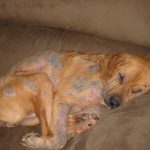
Suppose one talks about worms, especially those that live inside a dog’s stomach, pretty much distress many people. And with good reasons. I mean, it is cringe-worthy and, to be honest, just downright nasty. However, as with other things, knowledge is power. And to make sure you know what signs to look for and the preventive measures you can do so your dog stays “worm-free,” you need to dive deeper into their world.
Aside from the common roundworms, tapeworms, and hookworms, we have whipworm or Trichuriasis. They are whiplike worms thick on one side called anterior and thin on the other side called posterior, thus the name. The worm’s thicker end plant itself into your dog’s intestinal walls as it matures. While these parasites are having a party inside your pet’s body, your dog will experience discomfort. But don’t worry, we got the solution for you.
- The Trichuriasis or Whipworm Life Cycle
- What are the signs and symptoms of Trichuriasis or Whipworm?
- How is Trichuriasis or Whipworm transmitted in Dogs?
- What is the treatment for Trichuriasis or Whipworm in Dogs?
- How can Trichuriasis or Whipworm be prevented?
- Can Humans get Trichuriasis or Whipworm?
- Is Dog Trichuriasis or Whipworm contagious to other pets?
The Trichuriasis or Whipworm Life Cycle
Before we go ahead and provide the treatment, we need to know the enemy first. And there’s no better way to do that than study their lifecycle.
Adult whipworms reside in dogs’ large intestines and cecum, embedding themselves in the intestinal walls. The female adult whipworms will begin producing eggs around three months and are released together with the stool. Once outside, the eggs will wait for about ten days for them to reach the embryonated stage. In this stage, the eggs are ready to infect the dog. The eggs will hatch and embed into the intestinal wall and start another life cycle by ingesting.
What are the signs and symptoms of Trichuriasis or Whipworm?
Signs of whipworm are not visible at an early stage. The eggs will need time to hatch and embed into the colon and cecum before symptoms show. Thus, it is difficult for whipworms to be detected. And even during adult life, female whipworms may or may not release eggs periodically.
Irritation and discomfort
When whipworms embed themselves, it irritates dogs, which is the early sign of whipworm. But stool tests will not show results until after adult whipworms begin producing eggs. And even then, it is also hard to detect in the stools.
Diarrhea and weight loss
Whipworm also causes diarrhea and eventually weight loss in dogs. Dogs with whipworm also lost appetite. You will finally see changes in your dog’s behavior as well. From being energetic and full of life, your dog will look ill and lifeless. It may also not respond to your call and will just lay around.
Anemia and Blood stool
If whipworms are plenty inside your dog, you will also notice that it has blood stool. If you see blood with your dog’s stool, consult your veterinarian as soon as possible. It only means that whipworms are at an advanced stage, and this could lead to death.
How is Trichuriasis or Whipworm transmitted in Dogs?
Whipworm eggs are complex and are extremely difficult to get rid of or kill. They have a hard outer shell that could last up to 5 years in the right environment. Not only that, whipworm eggs are only about fifty micrometers by twenty micrometers in size, so a naked eye cannot see them. And since we all know that dogs like to sniff around, they can ingest it accidentally. Once consumed, it will only take a few months for the whipworm to mature and reproduce.
What is the treatment for Trichuriasis or Whipworm in Dogs?
Before using any medication, consult your veterinarian first for the safest way to treat your dog. Remember that medications will depend on your dog’s breed and size. Also, since whipworms are intestinal parasites, you cannot afford to experiment since they could lead to death.
Treatment of whipworms all requires two treatments. And most of the time, it even involves re=treatment. As mentioned above, whipworm eggs are hard to exterminate. And this only means your dog can get reinfected after a few weeks or months.
How can Trichuriasis or Whipworm be prevented?
Although whipworms eggs are hard to kill, we can certainly do something to prevent whipworms from reinfecting our beloved pets.
Dispose of stool properly.
Dogs are intelligent creatures and will remember whatever you are teaching them. You can train your dog to do their business at a specific location or have a dog trainer do it for you. It could be somewhere in your garden, or you may use a potty trainer for dogs. The main thing is, your dog will release the stool along with whipworm eggs into just one spot. Remove the dog stool and dispose of it properly as soon as possible. Clean the area with soap and water afterward. Make sure to use disposable gloves in dealing with dog stools for hygiene purposes.
A regular visit to the veterinarian
Set up a doctor’s appointment at least once every month so the doctor can check your dog after the treatment.
Don’t let your dog wander around.
Chances are, your dog got the infection from neighboring dogs. Do not let your dog wander around the neighborhood since a dog within the area may have whipworm.
Can Humans get Trichuriasis or Whipworm?
Luckily, Trichuriasis is not passable to humans. Humans also have another species of whipworm called Trichuris Trichiura that is common in tropical countries. But even if whipworm in dogs is not infectious to humans, we must still use precautions when cleaning and disposing of dog stool.
Is Dog Trichuriasis or Whipworm contagious to other pets?
Whipworms are present in dogs, wolves, pigs, and humans. However, even though whipworms can or infect many types of mammals (domestic or wild), it is not zoonotic, meaning it cannot pass it on from humans to mammals or vice versa. For example, the species of whipworm found in pigs are not the same species of whipworm found in humans or dogs. However, even though one species of whipworm infect only one species of animal, whipworm of any kind has the same symptoms and the same way they infect their host, so it is still best to take extra precaution on everything we do.

